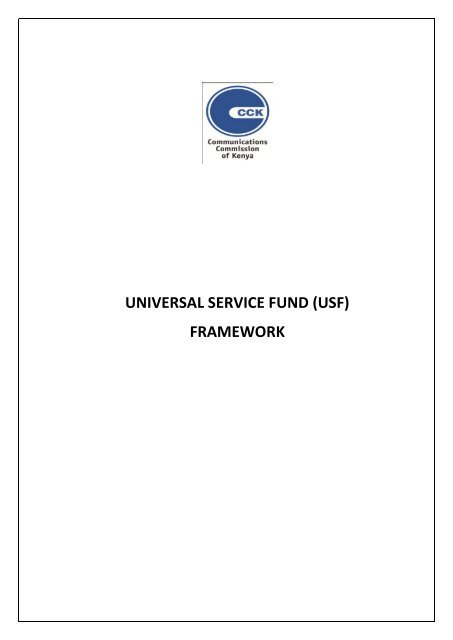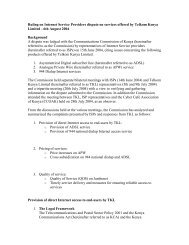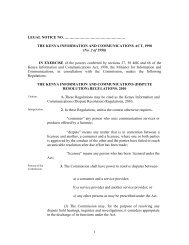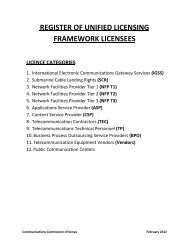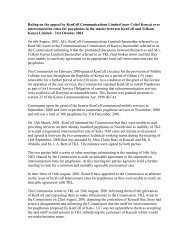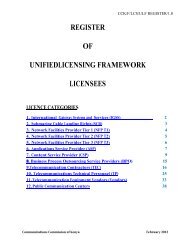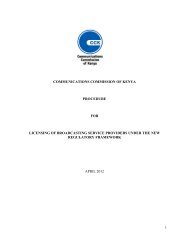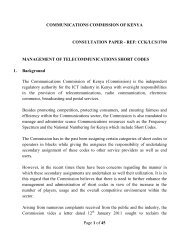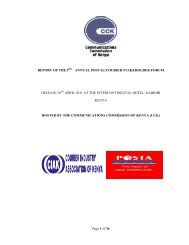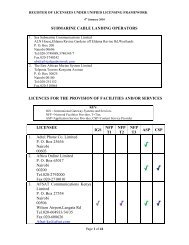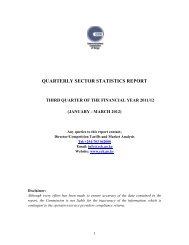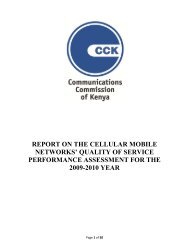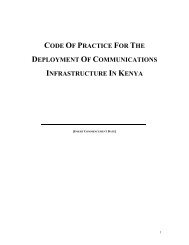(usf) framework - Communications Commission of Kenya
(usf) framework - Communications Commission of Kenya
(usf) framework - Communications Commission of Kenya
Create successful ePaper yourself
Turn your PDF publications into a flip-book with our unique Google optimized e-Paper software.
UNIVERSAL SERVICE FUND (USF)<br />
FRAMEWORK
TABLE OF CONTENTS<br />
TABLE OF CONTENTS ------------------------------------------------------------------ 2<br />
1 INTRODUCTION --------------------------------------------------------------------- 3<br />
2 OBJECTIVES OF THE FUND ----------------------------------------------------- 3<br />
3 FUND GOVERNANCE AND MANAGEMENT -------------------------------- 4<br />
3.1 GOVERNANCE ------------------------------------------------------------------------ 4<br />
3.2 FUND DISBURSEMENT --------------------------------------------------------------- 4<br />
3.3 MANAGEMENT OF THE FUND ------------------------------------------------------- 4<br />
4 SCOPE OF THE USF ----------------------------------------------------------------- 5<br />
4.1 GENERAL ----------------------------------------------------------------------------- 5<br />
4.2 USF PROGRAMS --------------------------------------------------------------------- 5<br />
4.2.1 Mobile Telephone Network Expansion ---------------------------------------- 6<br />
4.2.2 Community Broadband Networks ---------------------------------------------- 6<br />
4.2.3 ICT Content and Applications -------------------------------------------------- 6<br />
4.2.4 ICT Capacity Building and Awareness ---------------------------------------- 7<br />
4.2.5 Special USF Projects ------------------------------------------------------------ 7<br />
4.3 SERVICES AND FACILITIES TO BE SUPPLIED --------------------------------------- 8<br />
5 GUIDING PRINCIPLES OF USF OPERATIONS ----------------------------- 9<br />
5.1 GENERAL ----------------------------------------------------------------------------- 9<br />
5.2 TRANSPARENT PROCESSES --------------------------------------------------------- 9<br />
5.3 OPEN, COMPETITIVE PROCUREMENTS --------------------------------------------- 9<br />
5.4 NO DISTORTION OF THE MARKET ------------------------------------------------ 10<br />
5.5 INFRASTRUCTURE SHARING ------------------------------------------------------ 10<br />
5.6 UNIFORM CRITERIA FOR SELECTION OF AREAS -------------------------------- 10<br />
5.7 TECHNOLOGY NEUTRALITY ------------------------------------------------------ 11<br />
5.8 LIMITATIONS ON SUBSIDIES TO A SINGLE LICENSEE --------------------------- 11<br />
5.9 PUBLIC AWARENESS -------------------------------------------------------------- 11<br />
6 PROJECT PLANNING AND IMPLEMENTATION ------------------------ 11<br />
6.1 PROJECT DEVELOPMENT CRITERIA ---------------------------------------------- 11<br />
6.2 PROJECT PLANS -------------------------------------------------------------------- 12<br />
6.3 ELIGIBILITY CRITERIA FOR FUND APPLICANTS -------------------------------- 12<br />
6.4 COMPETITIVE BIDDING / REVERSE AUCTION FRAMEWORK------------------- 13<br />
6.5 MONITORING AND EVALUATION ------------------------------------------------- 13<br />
2
1 INTRODUCTION<br />
The government is committed to ensuring that all the citizens <strong>of</strong> <strong>Kenya</strong> have access<br />
to modern, high-quality communication services. While the private sector has an<br />
important role to play in meeting universal access targets through increased<br />
investments, there is a need for government to promote investments in rural and<br />
other un-served areas through provision <strong>of</strong> incentives.<br />
The <strong>Kenya</strong> Information <strong>Communications</strong> Amendment Act 2009 (KICA 2009) and<br />
the <strong>Kenya</strong> Information and <strong>Communications</strong> Regulations 2010 (KICR US&A<br />
2010), established the Universal Service Fund (USF) to complement private sector<br />
initiatives towards meeting universal access objectives.<br />
The Fund is primarily financed by mandatory contributions from licensed<br />
operators which provide services in the various communications market segments,<br />
with provisions for complementary financing from other sources.<br />
The <strong>Communications</strong> <strong>Commission</strong> <strong>of</strong> <strong>Kenya</strong> is mandated to manage and<br />
administer the Universal Service Fund. In discharging this mandate, the<br />
<strong>Commission</strong> has prepared this USF <strong>framework</strong>, to inform the public and all<br />
stakeholders about the key aspects, considerations and principles that the<br />
<strong>Commission</strong> shall uphold in administering the Fund.<br />
2 OBJECTIVES OF THE FUND<br />
The objectives <strong>of</strong> the Universal Service Fund as provided in the <strong>Kenya</strong> Information<br />
and <strong>Communications</strong> Regulations 2010, Universal Access and Service include:<br />
a) Promote communications infrastructure and services rollout in rural,<br />
remote and under-served areas<br />
b) Ensure availability <strong>of</strong> communication services to Persons with<br />
Disabilities, women and other vulnerable groups.<br />
c) Support the development <strong>of</strong> capacity building in ICTs and technological<br />
innovation;<br />
d) Support expansion <strong>of</strong> communication services to schools, health facilities<br />
and other organizations serving public needs; and<br />
e) Facilitate development <strong>of</strong> and access to a wide range <strong>of</strong> local and relevant<br />
content.<br />
3
3 FUND GOVERNANCE AND MANAGEMENT<br />
3.1 Governance<br />
The Fund shall be governed by the <strong>Communications</strong> <strong>Commission</strong> <strong>of</strong> <strong>Kenya</strong> (CCK)<br />
with oversight <strong>of</strong> the Universal Service Advisory Council, appointed by the<br />
Government.<br />
As per Section 84J (3) <strong>of</strong> KICR 2010, a Universal Service Levy (not exceeding one<br />
per cent <strong>of</strong> gross revenue) shall be charged on all Licensees <strong>of</strong>fering<br />
communications systems and services on a commercial basis including<br />
Telecommunication Network and Service Provider Licensees, Postal & Courier<br />
Licensees and Broadcasting Licensees.<br />
Other sources <strong>of</strong> funding may include:<br />
• Government appropriations<br />
• Income from investments by CCK<br />
• Gifts, Donations, Grants and Endowments<br />
The specific functions <strong>of</strong> the <strong>Commission</strong>, as relate to the USF, include collection<br />
<strong>of</strong> the funds as provided by the KICA 2009, and disbursement <strong>of</strong> these funds<br />
within the USF <strong>framework</strong>, through the Universal Service Obligations and<br />
Funding (USO&F) Division.<br />
3.2 Fund Disbursement<br />
The <strong>Commission</strong> shall ensure that utilization <strong>of</strong> the Fund is transparent to the<br />
public, and subject to independent audit. The award <strong>of</strong> disbursements shall be<br />
conducted through a transparent, non-discriminatory, and competitive process. It<br />
is the <strong>Commission</strong>’s intention to disburse funds in the form <strong>of</strong> non-reimbursable<br />
grants, for purposes <strong>of</strong> underwriting the capital and operating costs <strong>of</strong> projects to<br />
be implemented by Fund recipients, according to the <strong>framework</strong> described herein.<br />
3.3 Management <strong>of</strong> the Fund<br />
The <strong>Kenya</strong> Information and <strong>Communications</strong> (Universal Access and Service)<br />
Regulations, 2010, lay down the guidelines according to which the USF Accounts<br />
shall be prepared and maintained. The <strong>Commission</strong> shall have custody <strong>of</strong> the<br />
4
account books, cheque books, securities, investment instruments and other<br />
documents and papers pertaining to the Fund and the Fund Account.<br />
The books <strong>of</strong> accounts <strong>of</strong> the Fund shall be always open for inspection by the<br />
members <strong>of</strong> the Universal Service Advisory Council and the Licensees.<br />
The USF accounts shall be audited once a year by accredited pr<strong>of</strong>essional auditors<br />
appointed by the <strong>Commission</strong>, through an open and transparent process. In<br />
addition, consistent with the statutory audit requirements, a Government audit shall<br />
also be undertaken.<br />
In the course <strong>of</strong> managing the Fund, the <strong>Commission</strong> may make and liquidate<br />
investments <strong>of</strong> surplus sums. The amounts from the Fund shall be invested only in<br />
Government risk-free financial securities or schemes. Any interest/pr<strong>of</strong>its shall be<br />
credited to the USF account.<br />
4 SCOPE OF THE USF<br />
4.1 General<br />
The USF will devote its resources toward achieving the Objectives set out for the<br />
Fund, as identified above. CCK will define several broad USF Programs,<br />
associated with these objectives, and will implement specific USF Projects under<br />
each program, during each Fund operating year. In all cases, industry and public<br />
stakeholders will be consulted in the development <strong>of</strong> the goals, scope, and details<br />
<strong>of</strong> program <strong>framework</strong>s and project design.<br />
The Fund will seek to balance its activities and financing among these different<br />
initiatives, within the limitations <strong>of</strong> available budget and capacity. For each year’s<br />
operating plan, CCK and the USAC will determine, based upon consultations and<br />
market assessment, the appropriate allocation <strong>of</strong> funding for each program.<br />
Projects will be designed to fit these budget levels, with priority locations<br />
determined according to agreed, transparent criteria.<br />
4.2 USF Programs<br />
The following represent the tentative USF Programs that the USF administration<br />
intends to implement. Brief summary descriptions <strong>of</strong> the intended goals and<br />
outputs <strong>of</strong> each program are provided. These will be refined and expanded<br />
following stakeholder consultations.<br />
5
4.2.1 Mobile Telephone Network Expansion<br />
Projects under this program will target coverage gaps in mobile networks,<br />
where operators are unable or unwilling to extend service on their own. The<br />
Fund will work with operators to identify the boundaries <strong>of</strong> these gaps, and<br />
to determine the scope <strong>of</strong> infrastructure investment and other related costs<br />
that may require support from the USF to ensure full coverage. Priority<br />
projects will be those that reach the largest unserved populations in remote<br />
areas <strong>of</strong> the country.<br />
4.2.2 Community Broadband Networks<br />
The focus <strong>of</strong> this program will be to bring broadband connectivity into<br />
towns and villages where broadband is currently unavailable. The main<br />
requirements will be to establish broadband connections at major public<br />
institutions within each designated location. These include:<br />
Schools<br />
Health facilities<br />
Government <strong>of</strong>fices<br />
Post <strong>of</strong>fices<br />
Libraries<br />
Other community service locations<br />
Contracting operators that implement these projects will be responsible for<br />
constructing and operating the local broadband networks and services in the<br />
designated areas, providing end-user service to each institutional customer,<br />
according to agreed terms and conditions. The Fund will also support<br />
service subscription/usage costs for such institutions for an interim period.<br />
The operators will also be allowed and encouraged to <strong>of</strong>fer commercial<br />
broadband services to other customers (homes and businesses) in each area.<br />
Projects may also include a requirement to establish a public access ICT<br />
facility (community ICT center) in each designated location, potentially<br />
linked to a local post <strong>of</strong>fice or school. Management <strong>of</strong> such facilities would<br />
not be the direct responsibility <strong>of</strong> the operator, however.<br />
4.2.3 ICT Content and Applications<br />
Under this program, the USF will collaborate with other organizations and<br />
projects that focus on supporting development <strong>of</strong> content and applications <strong>of</strong><br />
value to rural and underserved communities. These may include web sites,<br />
6
mobile apps, educational and training materials, interactive and multimedia<br />
applications for special needs users, and other targeted ICT content. The<br />
Fund will look to co-finance development projects that serve priority needs,<br />
and also those that may become self-sustaining and commercially viable.<br />
4.2.4 ICT Capacity Building and Awareness<br />
The USF will support expanded capacity and awareness building,<br />
particularly in connection with other Fund projects. The Fund administration<br />
intends to establish ongoing relationships with qualified ICT training<br />
organizations, including private sector and university-based groups, to<br />
deliver customized public capacity building projects in communities where<br />
broadband networks and services are introduced for the first time. Projects<br />
may include hands-on training classes, public awareness raising events,<br />
assistance to local entrepreneurs, and both user and management training at<br />
public institutions. The goal will always be to ensure that new users in these<br />
communities have the best opportunity to benefit from the technologies as<br />
they become available.<br />
4.2.5 Special USF Projects<br />
The Fund may also undertake certain Special Projects that merit financing<br />
through the USF, and are consistent with the Fund’s priority objectives. For<br />
each Special Project, the Fund administration will solicit ideas, inputs, and<br />
requests from a range <strong>of</strong> stakeholders, and will prepare a tentative project<br />
plan for public comment. All details <strong>of</strong> the proposed project(s) will be open<br />
for scrutiny, including locations, services, beneficiaries, standards, and other<br />
terms and conditions.<br />
Every effort shall be made to put special projects to competitive auction,<br />
however if such an auction is not possible because <strong>of</strong> the nature <strong>of</strong> the<br />
special project, then this decision will also be subject to public input and<br />
comment. This may be the case, for example, where the Fund agrees to<br />
cooperate strategically with a particular public agency or department, such<br />
as the Post Office or Ministry <strong>of</strong> Education.<br />
The Fund administration may set a maximum limit on the amount <strong>of</strong> Fund<br />
resources that can be assigned to Special Projects during any given year.<br />
7
4.3 Services and Facilities to be supplied<br />
Each USF Program and USF Project will consist <strong>of</strong> clearly defined requirements<br />
for contractors to supply under the terms <strong>of</strong> the funding agreement. Contracting<br />
service providers shall be obligated to deliver the mandatory infrastructure,<br />
facilities, and/or services according to specific terms and conditions, including a<br />
clear timetable. Among the types <strong>of</strong> outputs that USF contractors may be required<br />
to provide are:<br />
Supply, installation, and operation <strong>of</strong> fiber optic cable, or equivalent<br />
transmission infrastructure, for backhaul network and last-mile<br />
connections.<br />
Construction and maintenance <strong>of</strong> wireless transmission masts and<br />
antennae, along with related support structures and equipment.<br />
Installation and operation <strong>of</strong> switching and routing equipment, s<strong>of</strong>tware,<br />
and supporting facilities, typically expanding existing core equipment.<br />
Provision <strong>of</strong> end-user customer services and support, equivalent to that<br />
provided to all commercial customers.<br />
Establishment <strong>of</strong> public access facilities, including computer equipment,<br />
s<strong>of</strong>tware platforms, servers, ancillary devices, and related structures and<br />
furnishings.<br />
Relevant end-user applications, information content, programming and<br />
development support, web hosting, etc.<br />
Contractors will be expected to deliver these and other outputs either via their own<br />
networks and systems, and/or through subcontracts and relationships with other<br />
appropriate suppliers, to the full satisfaction <strong>of</strong> all USF contract requirements.<br />
8
5 GUIDING PRINCIPLES OF USF OPERATIONS<br />
5.1 General<br />
CCK and the USAC shall operate the USF under clear and public rules <strong>of</strong><br />
procedure, and according to a set <strong>of</strong> firm principles. The following items describe<br />
some <strong>of</strong> these core principles that will guide implementation <strong>of</strong> the USF.<br />
5.2 Transparent Processes<br />
All activities <strong>of</strong> the USF shall be conducted in an open, transparent manner, in<br />
close consultation with private and public sector stakeholders. In developing<br />
program goals and project design, CCK shall consult directly with affected parties,<br />
including potential service providers, end user communities, and other<br />
organizations that may participate in the projects. The Fund’s accounts, including<br />
collections and spending, shall be publicly available on the CCK website, along<br />
with the results <strong>of</strong> all procurements, and criteria for all decisions. All USF rules<br />
and procedures shall also be open for public inspection and input.<br />
5.3 Open, Competitive Procurements<br />
CCK shall award USF project contracts only through open, competitive<br />
procurement procedures. All eligible providers will be allowed to bid for these<br />
contracts, following standard public rules. To ensure transparency, all bidding<br />
documents will be made publicly available, along with other key information about<br />
the bidding processes and the projects to be awarded. At the conclusion <strong>of</strong> every<br />
bidding, a summary <strong>of</strong> the bid evaluation, containing entire bidding process, its<br />
history, bid prices and the bidding result shall be publicized, including by being<br />
posted on the USF website. As projects are implemented, progress and monitoring<br />
reports will also be regularly updated on the Fund website.<br />
9
5.4 No Distortion <strong>of</strong> the Market<br />
CCK will always seek to ensure that the activities <strong>of</strong> the Fund do not distort or<br />
interfere with private sector market competition. The Fund will not be used to<br />
subsidize markets or services that can be served commercially without USF<br />
support. All market players will have fair and equal opportunities to compete for<br />
Fund resources, subject to additional criteria below.<br />
5.5 Infrastructure Sharing<br />
All service providers that receive USF funds shall be required to allow open, costbased<br />
sharing <strong>of</strong> infrastructure on facilities built under USF contracts to other<br />
licensed operators. Such sharing may include access to masts, cables, dark fiber,<br />
physical structures, ducts, equipment enclosures, and similar facilities. Terms,<br />
conditions, and restrictions on such shared access will be developed by CCK as<br />
part <strong>of</strong> the USF project implementation rules, to be developed in consultation with<br />
industry providers to ensure fairness and technically reasonable requirements.<br />
5.6 Uniform Criteria for Selection <strong>of</strong> Areas<br />
CCK shall develop clear and objective methods and criteria for prioritizing<br />
geographic zones where USF projects will be implemented. In general, priority<br />
will be given to rural, remote, and small towns and villages which are un-served or<br />
under-served by telecommunications networks and ICT services, and where<br />
commercial operators do not intend to provide service on their own. The factors<br />
that will determine which specific areas will be chosen for any given projects will<br />
be determined on a transparent and fair basis, including consultations with local<br />
stakeholders, taking account <strong>of</strong> such criteria as access and proximity to existing<br />
network infrastructure, size <strong>of</strong> population and density, status <strong>of</strong> supporting<br />
infrastructure (energy, roads, etc.), socio-economic conditions, and geographic and<br />
demographic diversity.<br />
10
5.7 Technology Neutrality<br />
In awarding USF projects, the <strong>Commission</strong> shall not expressly promote or disallow<br />
any particular technology platform, system, or architecture that can be<br />
demonstrated to achieve the required results. Bidders for USF contracts shall be<br />
allowed to propose any suitable current or new technology or design to fulfill<br />
project requirements, without penalty, as long as the chosen solution has a proven<br />
record <strong>of</strong> service in the field, anywhere in the world. Bidders will be encouraged<br />
to propose the most cost effective mix <strong>of</strong> technologies using any innovative and<br />
forward-looking solutions.<br />
5.8 Limitations on Subsidies to a Single Licensee<br />
The <strong>Commission</strong> shall endeavor to ensure that all Licensees contributing to the<br />
Fund have a fair and equal opportunity to receive subsidy funding under<br />
competitive project bids. In particular, the <strong>Commission</strong> will consider establishing<br />
maximum limits on the total number <strong>of</strong> projects or amount <strong>of</strong> payments from the<br />
Fund that any one licensee can receive during a given time period. The precise<br />
terms <strong>of</strong> such limits will be determined through a consultative rulemaking process.<br />
5.9 Public Awareness<br />
The <strong>Commission</strong> shall widely disseminate the purpose and objectives <strong>of</strong> the Fund<br />
through the media as well as by arranging public events, especially at places where<br />
USF Projects are being planned or implemented.<br />
6 PROJECT PLANNING AND IMPLEMENTATION<br />
6.1 Project Development Criteria<br />
The <strong>Commission</strong> will develop the scope, location, and details <strong>of</strong> specific projects<br />
to be implemented under the various Fund programs, in consultation with industry<br />
and local stakeholders. The Fund will not finance projects in locations that can be<br />
commercially served by competitive market players on their own. CCK will<br />
11
egularly review the status <strong>of</strong> market development and plans, and the scope and<br />
nature <strong>of</strong> gaps in network and service access, as an input to the project planning<br />
process. CCK shall also develop neutral and transparent criteria for selecting<br />
which eligible locations may receive priority attention for USF supported projects.<br />
6.2 Project Plans<br />
The <strong>Commission</strong> shall prepare a project plan for each project, in consultation with<br />
potential beneficiaries and industry. Each plan shall include a clear description,<br />
applicable service requirements, specifications and standards, service<br />
implementation timetable and any special commercial terms that would have an<br />
impact on the feasibility or business planning for the implementing contractor.<br />
Where the project is to be auctioned with a reserve price, the project plan shall also<br />
identify the maximum subsidy amount.<br />
6.3 Eligibility Criteria for Fund Applicants<br />
In the competitive bidding for projects requiring provision <strong>of</strong> infrastructure,<br />
connectivity and service, only duly licensed operators shall be eligible to<br />
participate.<br />
A Licensee shall be disqualified from taking part in a tender if it:<br />
a) defaults in payment <strong>of</strong> its USF contribution;<br />
b) has failed to complete previously granted contracts<br />
Other specific eligibility and qualification criteria will apply to each project, to<br />
ensure that only well qualified participants may compete for USF financed<br />
projects.<br />
Public sector entities and other non-licensees shall be eligible to bid for special<br />
projects relating to ICT services and applications, if such systems or services do<br />
not require a license from CCK.<br />
12
6.4 Competitive Bidding / Reverse Auction Framework<br />
The existing Public Procurement Legislation shall govern the competitive bidding<br />
process for USF project contracts.<br />
The <strong>Commission</strong> shall prepare a Bidders’ Information Package which will be<br />
provided to all interested eligible bidders. The Package shall include detailed<br />
information about the project, instructions to potential bidders on how to<br />
participate, eligibility requirements, format <strong>of</strong> bid submissions, and amount <strong>of</strong> bid<br />
bond, any applicable reserve price and any other requirement <strong>of</strong> the bid.<br />
The <strong>Commission</strong> shall conduct technology-neutral evaluations <strong>of</strong> bidders’<br />
technical submissions to ensure the proposed solutions will comply with project<br />
requirements, but will not otherwise prescribe specific architecture, platforms, or<br />
service delivery mechanisms. In all USF competitive procurements, only the<br />
technically qualified bidder requiring the LOWEST subsidy shall be awarded USF<br />
project contracts.<br />
If any collusion among bidders is suspected, the <strong>Commission</strong> shall have the right<br />
to cancel the bid and subsequently re-bid. If no bid is received, the <strong>Commission</strong><br />
shall discuss with the Licensees the reasons and review the bidding process and<br />
constraints accordingly.<br />
6.5 Monitoring and Evaluation<br />
The <strong>Commission</strong> shall implement a robust Monitoring and Evaluation <strong>framework</strong><br />
to oversee all USF financed projects. This shall include regular onsite and <strong>of</strong>fsite<br />
monitoring <strong>of</strong> all projects to make sure that the funding is being utilized in<br />
accordance with the contracts.<br />
In addition, the <strong>Commission</strong> will undertake impact evaluation studies to assess the<br />
performance <strong>of</strong> USF projects, and whether the USF programs in general are<br />
meeting their objectives. Further, the evaluations will be used to assess the<br />
effectiveness and impact <strong>of</strong> USF programs towards the achievement <strong>of</strong> the<br />
universal access goals in <strong>Kenya</strong>.<br />
13


